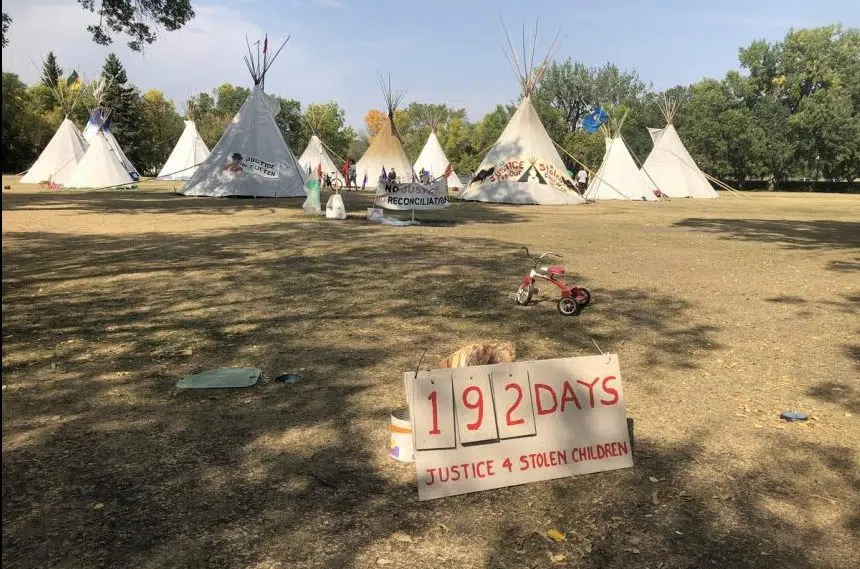A Saskatchewan judge has ordered the protesters with the Justice for our Stolen Children camp to take down their teepees and leave Wascana Park.
The protesters originally set up the Justice for our Stolen Children camp in February to bring attention to the over-representation of Indigenous children in the foster care system and the justice system.
Judge sides with government as landowner
In the court ruling, the Justice Ysanne Wilkinson with the Court of Queen’s Bench in Regina acknowledged “the profound sense of loss that lies at the core of the protest” but ultimately sided with the provincial government in its right to control the use of Wascana Park as the owner of the land.
The ruling gives authority to the Provincial Capital Commission and government to forcibly remove all teepees and property from Wascana Park.
Police can arrest anyone who interferes with the removal of the teepees or resists the order to get out and may be brought before the court to show why they should not be cited in contempt.
The court ruling leaves the manner of enforcement including removal and arrest of protesters to the discretion of police.
Previous arrests were reasonable: judge
Regina police arrested some protesters in June after an eviction notice by the government was ignored. The protesters were later granted a meeting with some provincial government officials in Fort Qu’Appelle on July 2 but decided to stay put after the meeting.
The protesters launched their own legal action against the province and police in relation to the arrests in June. They argued the arrests were unconstitutional, breaking their right to freedom of expression. The court found the actions by police to be reasonable.
The judge wrote there is no doubt the protesters were trespassing on government property and failed to seek permission for their encampment and have been knowingly intruding on the land for six months.
The ruling also specifically referred to nine pre-authorized public events which were forced to relocate from the west lawn of Wascana Park. Despite the protesters’ denial that they intended to assert exclusive dominance over the area of the camp, that it was essentially “co-opted during the fleeting summer months”.
“Those who abided by the rules and regulations have been ousted by those who failed to comply.”
Upon learning of the court order Friday, people at the Justice for our Stolen Children camp are expected to speak to the media later in the afternoon.
Provincial government pleased with court decision
The province issued a written statement from Minister Responsible for the Provincial Capital Commission Ken Cheveldayoff, saying the government is pleased with the court decision and expects the camp to abide by the court order to remove the teepees “within a reasonable time.” If they fail to do so, the order gives the government and police full authority to take them down.
“Again, we are fully supportive of peaceful protests but the act of overnight camping, burning combustibles and erecting structures in the park cannot be done without the proper permits and approvals, as confirmed by today’s court order,” Cheveldayoff wrote in a statement Friday afternoon.
Camp will remain over the weekend
Members of the Justice for our Stolen Children camp have kept an open line with the government through their lawyer about the decision and say their understanding is they can remain in the park over the weekend. As of Monday morning, the camp remained.
“What’s hard for us right now is that the issues that we’ve brought forward in this camp are still not being heard,” Robyn Pitawanakwat said, noting that was the most frustrating part of the decision.
As of Friday afternoon, the camp hadn’t finished reading through the entire 56-page decision and was in the process of speaking to their lawyers.
“We just want the focus to remain on the issues that we are bringing forward, on the Indigenous youth, Indigenous children, the ones that are in care, the ones that have died, whose deaths have never been investigated,” Pitawanakwat said.
She the camp has succeeded in getting people to have conversations they wouldn’t normally be comfortable having.
“People know to come here, to find us here, this is a beacon for them of a different way of interacting with bureaucracy so we’ve definitely achieved a safe space for people to come and share their stories and reach out for help.”
Pitawanakwat said they still need to meet with lawyers before deciding on an appeal.
FSIN ‘outraged’ with ruling
The Federation of Sovereign Indigenous Nations (FSIN) put out a written statement Friday afternoon indicating it is “outraged that the Saskatchewan Government refuses to honour the Inherent and Treaty Rights of First Nations children in Saskatchewan.”
“This ruling only solidifies what we have known for many years; the Inherent and Treaty Rights of our First Nations children are not a priority for Saskatchewan or the Justice System” FSIN Chief Bobby Cameron said in the release.
He went on to add the current welfare system continues to contribute to problems First Nations youth face.
FSIN said the camp had grown to 13 teepees at one point and claimed nearly one thousand visitors a day would show up with files that had fallen through the cracks.
The organization also suggested members of the camp have told them they plan on appealing.
Police to look over ruling
The Regina Police Service said the first course of action Chief Evan Bray will take is to read over the decision, reflect on the order and consult with stakeholders.
Police retain discretion as to the enforcement of the order. Police indicated there is still time to communicate with all parties in order to find a peaceful resolution.
You can read the full ruling in a 56-page document by the Court of Queen’s Bench on Friday afternoon.







